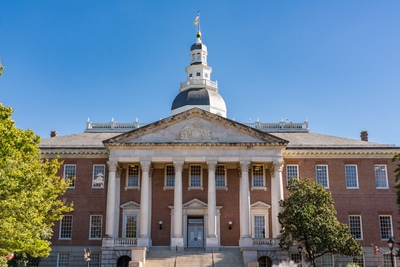
Financial Services & Commerce
Retailers Look to Policymakers to Navigate the Post-Penny Era
December 9, 2025 | Katherine Tschopp
March 7, 2017 | Bill Kramer
Five states have passed legislation to automatically enroll business employees in state-sponsored Individual Retirement Accounts (IRAs) if the businesses do not themselves offer retirement benefits, but Congress could derail these programs before they get off the ground.
More than 30 million U.S. workers report that they do not have access to an employer-based retirement plan, according to a Pew Charitable Trusts analysis. Overall, Pew found that only 58 percent of U.S. workers had access to such a plan. Employers — particularly small businesses — face multiple challenges to offering their employees a retirement plan. As a result, only 70 percent of small businesses, and nearly a third of U.S. firms overall, do not offer employees a retirement plan.
In an attempt to narrow this coverage gap, we've written in the past about how states have begun to “nudge” small business workers toward enrolling in state-run retirement programs.
The legislation directed the California Secure Choice Retirement Savings Investment Board to conduct a feasibility study and market analysis before the program can be fully implemented. After studying the Board's analysis, the state legislature passed legislation to authorize the implementation of the Secure Choice Program late last year (also named CA SB 1234). “Once Secure Choice is fully operational, employers with 5 or more employees that don't already provide a retirement plan will be required to either begin to offer a retirement plan or provide their employees access to Secure Choice.”
Meanwhile, Oregon (OR HB 2960) and Illinois (IL SB 2758) passed similar plans in 2015, and Oregon's program is scheduled to begin enrolling employees later this year. Maryland (MD HB 1378) and Connecticut (CT HB 5591) also passed auto-enroll IRA programs last year.
Under the Obama Administration, the U.S. Department of Labor (DOL) issued a final rule and guidelines to eliminate potential federal obstacles to states that seek to implement their own IRA programs. Particularly, the DOL guidance will exempt state programs from the Employee Retirement Income Security Act (ERISA) — a federal law that preempts most state laws relating to employee benefit plans — as long as certain conditions are met.
ERISA preemption remained a big question mark for states contemplating their own programs, and the DOL guidance was intended to assuage many of those concerns. Additionally, DOL clarified that fiduciary responsibility for such plans falls to the state, not employers.
In a February 13 letter, the National Conference of State Legislatures (NCSL) urged Congress not to repeal the DOL rule allowing state-run IRA programs to move forward. NCSL noted: “As the number of workers who lack enough savings to cover the costs of retirement expenses continues to grow, states need the flexibility to develop creative solutions to this problem. Restricting the ability of states to establish private sector savings plans will put an even greater strain on public finances because states and the federal government are ultimately responsible for funding the social safety programs that are utilized by retirees who are not financially independent.”
Congressional opponents of state-run, auto-enroll IRA programs have urged support for repealing the rule. “Our nation faces difficult retirement challenges, but more government isn’t the solution,” Rep. Tim Walberg (R-MI) said in a statement. Another supporter of the rule's repeal, Rep. Francis Rooney (R-FL), argued that, “Employers will face a confusing patchwork of rules, and many small businesses may forgo offering retirement plans altogether. Congress must act to protect workers and small businesses from these misguided regulations.”
California lawmakers have already vowed to move forward with the state's program even if Congress repeals the federal regulation, guaranteeing the issue will end up in court. Regardless of the DOL rule's fate or any subsequent legal battles, states will continue to explore avenues further encouraging workers to save for retirement.
.png)

December 9, 2025 | Katherine Tschopp

December 9, 2025 | Marvin Yates

October 17, 2025 | Sandy Dornsife